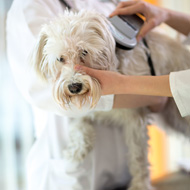Risk of microchip problems 'likely to be very low'

The majority of reports involved microchip migration.
The risk of animals having an adverse reaction to microchipping is thought to be 'very low', according to a new report by the Veterinary Medicines Directorate (VMD).
Changes in the law made it a legal requirement to report microchip problems in dogs from February 2015 in England, and April 2016 in Scotland and Wales.
The VMD received 1,420 reports of adverse microchip events between April 2014, when it first launched its reporting scheme, and December 2015. Of these, most related to dogs (84.2 per cent) and the majority involved cases of microchip migration (729), followed by microchip failure (630) and adverse reactions (61).
Sales information for microchips is not currently available, meaning it is impossible to calculate the risk of an adverse reaction from these figures. However considering there are an estimated 8.5 million dogs and 7.5 million cats in the UK, combined with the low number of reported adverse events - despite high uptake of dog microchipping in 2015 - the VMD believes the likelihood is 'very low'.
An adverse reaction is defined as any unwanted signs or symptoms following microchipping. Of the 61 cases reported, reactions included lumps, masses or swellings at the implant site; calcification on or near the site of the microchip; discharge from abscesses and other swellings; infections at the implant site; and removal or loss of the chip. There were also a few reports of equipment problems and some that included details of vaccinations given either before or at the same time as the chip was implanted.
Chip failure is when a microchip has not been found after a full body scan with a working scanner. Although there were 630 such reports, the VMD says only 56 of these can be considered true failures, as the presence of the chip was not confirmed in the other cases.
Out of the 729 reports of migration (where the chip has moved a significant distance from the implant site), nearly 300 cases were unlikely to be migrations, according to the report, as the chip was still within the neck/scapula/shoulder area. In total, 302 reports appear to be true migrations.
There was a variety of missing information in the reports received. The confusion in supplying the required information is 'no surprise', the VMD wrote, as there are such a large number of microchip manufacturers, brand names, implanter organisations and databases. Efforts are being made to improve the reporting form to make it easier to complete.
In the next year, the VMD will provide clearer guidance, which it hopes will reduce the number of 'unlikely' migration reports. It also plans to collect sales details from each of the manufacturers to improve interoperation of the results.



 The RCVS has announced a new version of its 1CPD mobile app, with enhanced features for veterinary surgeons and veterinary nurses to record their continuing professional development.
The RCVS has announced a new version of its 1CPD mobile app, with enhanced features for veterinary surgeons and veterinary nurses to record their continuing professional development.